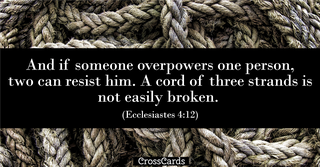
Change Translation
- Recent Translations
- All Translations
Images for Ecclesiastes 4:14

Ecclesiastes 4:14 Meaning and Commentary
For out of prison he cometh to reign
That is, this is sometimes the case of a poor and wise child; he rises out of a low, mean, abject, obscure state and condition, to the highest dignity; from a prison house, or a place where servants are, to sit among princes, and even to have the supreme authority: so Joseph, to whose case Solomon is thought to have respect, and which is mentioned in the Midrash; who was but a young man, and poor and friendless, but wise; and was even laid in prison, though innocent and guiltless, from whence he was fetched, and became the second man in the kingdom of Egypt; so David, the youngest of Jesse's sons, was taken from the sheepfold, and set upon the throne of Israel: though Gussetius F5 interprets this of the old and foolish king, who comes out of the house or family, (Mydwoh) , of degenerate persons, as he translates the word, with a degenerate genius to rule; the allusion being to a degenerate vine; which sense agrees with ( Ecclesiastes 4:13 ) , and with what follows; whereas also [he that is] born in his kingdom becometh poor;
who is born of royal parents, born to a kingdom; is by birth heir to one, has it by inheritance, and has long possessed it; and yet, by his own misconduct, or by the rebellion of his subjects, he is dethroned and banished; or by a foreign power is taken and carried captive, and reduced to the utmost poverty, as Zedekiah, Nebuchadnezzar, and others: or if born poor, so Gussetius; with a poor genius, not capable of ruling, and so loses his kingdom, and comes to poverty. Or it may be rendered, "although in his kingdom he is born poor" F6; that is, though the poor and wise child is born poor in the kingdom of the old and foolish king; yet, out of this low estate, in which he is by birth, he comes and enjoys the kingdom in his room to such a strange turn of affairs are the highest honours subject: or, "for in his kingdom he is born poor" F7; even the person that is born heir to a crown is born a poor man; he comes as naked out of his mother's womb as the poorest man does; the conditions of both are equal as to birth; and therefore it need not seem strange that one out of prison should come to a kingdom. But the first sense seems best.
F5 Ebr. Comment. p. 553.
F6 (Mg yk) "quamvis etiam", Gejerus.
F7 "Nam etiam", Tigurine version, Cocceius; "quia etiam", Pagninus, Montanus, Schmidt, Rambachius, so Aben Ezra.
Ecclesiastes 4:14 In-Context
Study Tools
PLUSUnlock Notes
This feature is for PLUS subscribers only. Join PLUS today to access these tools and more.
JOIN PLUSUnlock Highlights
This feature is for PLUS subscribers only. Join PLUS today to access these tools and more.
JOIN PLUSUnlock Bookmarks
This feature is for PLUS subscribers only. Join PLUS today to access these tools and more.
JOIN PLUSTrack Your Reading
Create a free account to start a reading plan, or join PLUS to unlock our full suite of premium study tools.